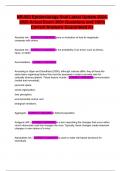NR-503 Epidemiology final Latest Update 2024-
2025 Actual Exam 300+ Questions and 100%
Correct Answers Guaranteed A+
Absolute risk - CORRECT ANSWER: gives no indication of how its magnitude
compares with others.
Absolute risk - CORRECT ANSWER: is the probability of an event, such as illness,
injury, or death
Accomadation - CORRECT ANSWER:
According to Giger and Davidhizer (2000), although cultures differ, they all have the
same basic organizing factors that must be assessed in order to provide care for
culturally diverse patients. These factors include - CORRECT ANSWER: communication
(verbal and nonverbal);
personal space;
social organization;
time perception;
environmental control; and
biological variations.
Aggregate - CORRECT ANSWER: A defined population
Antigenic drift - CORRECT ANSWER: is a term describing the changes that occur within
virus's ribonucleic acid that changes the virus. Typically, these changes create seasonal
changes or new strains of a virus
Attrubutible risk - CORRECT ANSWER: is used to make risk-based decisions for
individuals.
,Call to action - CORRECT ANSWER: It falls to nurses and midwives, the most
numerous and arguably most patient-centered component of the health workforce, to
assume a leadership role in addressing planetary health. Leadership begins with
educating ourselves, students, staff, patients, and communities. Engagement in political
and policy processes are needed-and can take many forms. Even small measures may
have impact. Local level sustainability and readiness is meaningful at one's university,
hospital, and or health system levels.
Learn
Communicate
Find common ground
Clinical disease - CORRECT ANSWER: disease characterized by signs and symptoms
common-vehicle exposure - CORRECT ANSWER: group of people are exposed to a
substance/organism that causes common illness
Community - CORRECT ANSWER: Composed of multiple aggregates
Cultural Awareness - CORRECT ANSWER: :Self-examination of one's own prejudices
and biases toward other cultures. An in-depth exploration of one's own cultural/ethnic
background.
Cultural competence - CORRECT ANSWER: Cultural competence is defined as "a
dynamic, fluid, continuous process whereby an individual, system or health care agency
find meaningful and useful care delivery strategies based on knowledge of the cultural
heritage, beliefs, attitudes, and behavior of those to whom they render care"
Cultural competence in nursing consists of four principles. - CORRECT ANSWER: Care
is designed for the specific client.
Care is based on the uniqueness of the person's culture and includes cultural norms
and values.
,Care includes self-employment strategies to facilitate client decision making to improve
health behaviors.
Care is provided with sensitivity and is based on the cultural uniqueness of clients.
Cultural Desire - CORRECT ANSWER: Motivation of the healthcare provider to "want"
to engage in the process of cultural competence, characteristics of compassion,
authenticity, humility, openness, availability, and flexibility, commi tment and passion to
caring, regardless of conflict.
Cultural humility - CORRECT ANSWER: A lifelong commitment to self-evaluation and
self-critiques, redressing the power of imbalances in the patient- physician dynamic,
developing mutually. Beneficial relationships.
Cultural Knowledge - CORRECT ANSWER: Obtaining a sound educational foundation
concerning the various worldviews of differences cultures. Obtaining knowledge
regarding biological variations, disease and health conditions and variation in drug
metabolism.
Cultural Skill: - CORRECT ANSWER: Ability to collect culturally relevant data regarding
the client's health history and presenting problem. Ability to conduct culturally based
physician assessments. Conducting these assessments in a culturally sensitive manner.
Data - CORRECT ANSWER: Compiled information
Disaster epidemiology - CORRECT ANSWER: "Disaster epidemiology is defined as the
use of epidemiology to assess the short- and long-term adverse health effects of
disasters and to predict consequences of future disasters. It brings together various
topic areas of epidemiology including acute and communicable disease, environmental
health, occupational health, chronic disease, injury, mental health, and behavioral
health"
Domain 1 - CORRECT ANSWER: DOMAIN 1: Capacity Strengthening
, Capacity strengthening is the broad sharing of knowledge, skills, and resources for
enhancement of global public health programs, infrastructure, and workforce to address
current and future global public health needs.
1.1Design sustainable workforce development strategies for resource-limited settings.
1.2Identify methods for assuring health program sustainability.
1.3Assist host entity in assessing existing capacity.
1.4Develop strategies that strengthen community capabilities for overcoming barriers to
health and well-being.
Domain 2 - CORRECT ANSWER: DOMAIN 2: Collaborating and Partnering
Collaborating and partnering is the ability to select, recruit, and work with a diverse
range of global health stakeholders to advance research, policy, and practice goals, and
to foster open dialogue and effective communication.
2.1Develop procedures for managing health partnerships.
2.2Promote inclusion of representatives of diverse constituencies in partnerships.
2.3Value commitment to building trust in partnerships.
2.4Use diplomacy and conflict-resolution strategies with partners.
2.5Communicate lessons learned to community partners and global constituencies.




